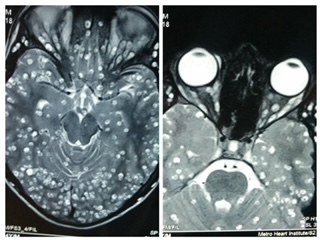Ocular cysticercosis is a parasitic infection that affects the eye. It occurs when the larvae of the pork tapeworm, Taenia solium, infest the eye tissues. It is a rare condition, but it can lead to vision loss if left untreated.
Ocular cysticercosis is caused by the ingestion of contaminated food or water. The pork tapeworm is prevalent in areas where sanitation is poor, and pigs are allowed to roam freely. When humans consume undercooked pork or contaminated water, they can become infected with the tapeworm. The tapeworm larvae can migrate to various organs, including the eye, and form cysts.
The symptoms of ocular cysticercosis can vary, depending on the location and size of the cyst. Some patients may not experience any symptoms at all. Common symptoms include eye pain, redness, and swelling, blurred vision, floaters, and sensitivity to light. In some cases, the cyst may cause retinal detachment or inflammation of the optic nerve, leading to vision loss.
Diagnosis of ocular cysticercosis usually involves a comprehensive eye examination. The eye doctor may use specialized equipment, such as a slit lamp or ophthalmoscope, to examine the eye tissues for signs of inflammation or cysts. In some cases, an ultrasound or MRI may be performed to locate the cysts.
The treatment of ocular cysticercosis depends on the location and size of the cysts. Small cysts that do not cause any symptoms may not require treatment. However, larger cysts or those that are causing vision problems may require surgical removal. The surgical procedure involves making a small incision in the eye and removing the cyst. In some cases, medications such as albendazole or praziquantel may be prescribed to kill the tapeworm larvae and prevent further infection.
Prevention of ocular cysticercosis involves practicing good hygiene and avoiding the consumption of undercooked pork or contaminated water. It is essential to wash hands thoroughly before and after handling food, and to cook pork to an internal temperature of 160 degrees Fahrenheit. It is also important to ensure that drinking water is treated or boiled before consumption.
In conclusion, ocular cysticercosis is a rare but serious condition that can lead to vision loss if left untreated. It is caused by the ingestion of contaminated food or water and can affect the eye tissues. Early diagnosis and prompt treatment are essential to prevent complications and restore vision. Practicing good hygiene and avoiding the consumption of contaminated food and water can help prevent ocular cysticercosis.
At The Eye Center- Dr. Mahnaz Naveed Shah & Associates our team of eight ophthalmology subspecialists/ eye specialists, eye surgeons who are considered amongst the very best eye specialists in Karachi and in Pakistan, have the diagnostic and treatment capabilities to treat from the simplest to the most complex patients. We work hard to provide our patients with the best possible medical and surgical eye care, in a state of the art purpose built eye care facility. We offer the entire array of medical, laser and surgical treatments to help provide patients the best possible care in the most efficient, safe and ethical manner.
If you need an appointment, please contact us at 03041119544 during our working hours or leave us a WhatsApp message at +923028291799 and someone will connect with you. Walk-in appointments are also available for emergencies. We can also be reached through our web portal on www.surgicaleyecenter.org


